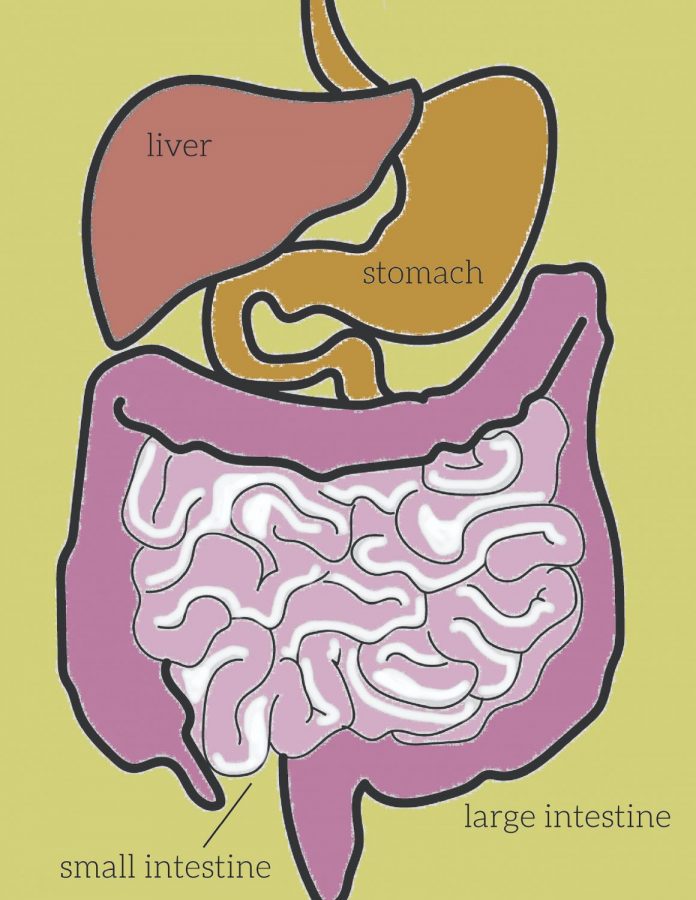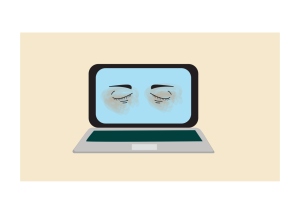Trust Your Gut: How Stress and Diet Affect Digestion
New lifestyles in response to the COVID-19 pandemic have had negative effects on people’s GI tract
April 28, 2021
The human body is intricately connected. Our digestive and gastrointestinal (GI) tracts are linked to the nervous system, the immune system and the hormones that our bodies release in response to external factors. One alteration in these systems can cause an imbalance in our health. Feelings of stress that are heightened due to the COVID-19 pandemic, lifestyle changes and virtual academics are among the main factors responsible for depression and changes in the gut microbiome that negatively affect our digestive tract.
The Human Digestive System
The digestive system is formed by the GI tract, which includes hollow organs like the mouth, esophagus, stomach, small intestine, large intestine and anus. It also includes solid organs like the liver, pancreas and gallbladder.
As humans, we need to eat proteins, lipids, minerals, nucleic acids and carbohydrates. The digestion of these specific structures refers to the breakdown of food molecules through enzymatic action into small chemical components that the body can distribute to various tissues. For example, proteins can be broken down into amino acids and carbohydrates can be split to form simple sugars.
Instead of having probiotics, individuals can also improve their gut health by consuming prebiotics such as artichokes, garlic and asparagus
The bacteria in the GI tract are called the gut flora or microbiota; they create a suitable environment to help with digestion and with the stimulation of the immune system to break down toxic foods and make vitamins and amino acids.
According to the Harvard T.H. Chan School of Public Health, some of the large families of bacteria in the human gut prevent the overgrowth of harmful bacteria by getting to the sites of nutrients first. This is why many people take probiotics — they allow bacteria that are beneficial to recolonize your gut. Instead of having probiotics, individuals can also improve their gut health by consuming prebiotics such as artichokes, garlic and asparagus.
Stress Through the Gut-Brain Axis
There is constant communication and signaling involved between the brain and microorganisms living in your gut. Specifically, stress hormones like cortisol can reshape the gut bacteria’s composition through excessive inflammation and autonomic alterations. This results in the release of toxins and neurohormones that can cause harmful changes in eating behaviors, moods and stress responsiveness.
Production of the stress hormone cortisol is triggered by the hypothalamic-pituitary-adrenal axis, which connects the nervous system to the GI tract. Another one of these hormones released is tryptophan — a substrate of serotonin that helps produce feelings of happiness in the brain. If no tryptophan is released, there will be an inhibited release of serotonin. This causes the brain to receive negative feedback that can lead to depressive disorders, a compromised immune system and symptoms of nausea and fatigue.
There has been an increase in gut-related problems in individuals since the start of the pandemic due to increased stress, sedentary lifestyles and poor eating habits. Inflammatory diseases that arise from digestive issues start a chain of problems that then affect cardiovascular health, the nervous system and the body’s ability to fight viruses.
Things to Consider
Many treatments help the gut-brain connection repair the physical communication through the nervous system, as well as chemical communication through hormones and neurotransmitters. Dietary changes, natural supplements and stress-reducing activities like therapy or yoga have been proven to help improve the gut-brain connection.
Eating a well-balanced and nutritious diet not only keeps the gut healthy but also provides quality energy to the rest of the body. Replacing processed and fried foods with whole grains, lean meats and fish will allow for smoother digestion. Additionally, looking into probiotics that contain live bacteria can be crucial in fighting off harmful bacteria. Examples include yogurt with active cultures, fermented teas like kombucha and miso soup. Overall, maintaining a healthy lifestyle that combines rigorous physical activity along with a nutritious diet can be beneficial in keeping your bodily functions working efficiently.















